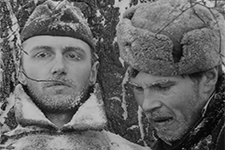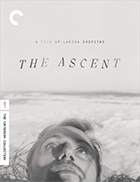The Ascent (Voskhozhdenie)
|  Larisa Shepitko’s The Ascent (Voskhozhdenie), which takes place during World War II and tells the story of two Soviet partisans battling against the invading German army during a brutal winter in Byelorussia (present-day Belarus), is a powerful film both physically and spiritually. The ruthless winter conditions in which it was shot translate directly into the images, giving them a bone-chilling physicality—a sense of presence and palpable experience—that is comparable to the more daring works of Werner Herzog, who always insisted on shooting on location regardless of how dangerous that location might be. The freezing cold is its own character in The Ascent, and it wraps itself around everything, adding to the film’s unique balance of realism and mystical lyricism. The story unfolds over several days, opening en media res as we join during the opening credits with a rag-tag group of desperate Soviet partisans and villagers dragging themselves through the heavy snow, trying to avoid German patrols. Two of the men—the blonde-haired, doe-eyed Sotnikov (Boris Plotnikov) and the dark-haired, hard-eyed Rybak (Vladimir Gostyukhin)—soon stand out, their differences in appearance and temperament belied by their need to work together to survive. After a skirmish with German soldiers that leaves Sotnikov shot in the leg, they make their way to a remote farmhouse occupied by a woman named Demchikha (Lyudmila Polyakova) and her three young children. Demchikha, despite a gruff demeanor, does her best to hide them when the German soldiers arrive, but the ruse fails and they all end up in custody, taken away to a local village and interrogated by a beady-eyed, collaborationist official (Anatoliy Solonitsyn). Sotnikov, who is steadfast in his determination to remain allied to the cause, never waivers, while Rybak, who is practical and limited in his loyalties, is torn by his desire to survive, even if that means collaborating with the Germans. Thus, the film, which was an adaptation of prolific Soviet writer Vasiliy Bykov’s 1970 novella Sotnikov, is fundamentally about death—or, more specifically, how we respond to the threat of imminent demise. As Shepitko put it in her final interview in June 1979, “At that time, I was facing death for the first time [a reference to the danger she faced giving birth to her son shortly after a major spinal injury], and like anyone in such a situation, I was looking for my own formula of immortality.” Sotnikov and Rybak are both thrust by the maw of history and war into an unthinkable situation in which they must first struggle to survive and then confront death at the hands of the Nazis (it should be noted that Byelorussia was the site of numerous Nazi atrocities during the war, with an estimated 1 million people killed during the three-year German occupation, giving the frigid location an especially tense significance). Sotnikov, as played by Boris Plotnikov, a theatre actor in his first film role, at first appears to be weak, especially as compared to the ruthless survival instincts embodied by Rybak; but, as the film progresses, we begin to recognize an almost ethereal strength in his actions, in his refusal to speak to the German authorities, in his submission to his fate. There is no “one moment” when he transfigures from victim to martyr; rather, it is a slow, almost imperceptible progression, but one so strong and unyielding that his stepping onto the gallows becomes not an act of defeat, but a transfiguration of the horrors of wars into a beatific act of spirituality. The harsh black-and-white cinematography by Vladimir Chukhnov is imminently flexible in its effect, using the nearly abstract depiction of the snow-choked landscape to strike us with bone-chilling intensity, but also transforming Sotnikov’s experience into something that approaches the divine (the moody, ethereal musical score by veteran composer Alfred Schnittke has a significant impact, as well). Unfortunately, The Ascent was Shepitko’s last film, as she died in a car crash, along with four others, two years later outside of Leningrad while location scouting for her next film (in a diary entry on the day she was buried, the great Russian director Andrei Tarkovsky noted that the crash “was so sudden that no adrenaline was found in their blood”). During that short life (she was only 41 when she died), Shepitko completed four theatrical features, a made-for-television movie, and a segment of an omnibus film, and much of her career was mired in conflict with the Soviet censors. The release of Wings (Krylya, 1966), which told the story of a former fighter pilot working as a school principal, was extremely limited and the film was eventually banned outright; her segment for the omnibus film Beginning of an Unknown Era (Nachalo nevedomogo veka, 1967) was shelved for 20 years because the authorities felt that its depiction of the Bolsheviks was negative; and You and Me (Ty i ya, 1971) had to be cut before the government would allow it to play as an official entry in the Venice Film Festival. Around that same time Mosfilm replaced her with Andrey Smirnov on Belorussky Station (Belorusskiy vokzal, 1971) when government censors caught wind of changes she was planning from the source novel. One might think that, given its clear spiritual and mystical overtones, The Ascent might have run into similarly censorious issues with the government authorities, but Shepitko was able to marshal the project through with no objections, partially because the wartime setting and the depiction of Soviet resilience in the face of atrocity was viewed as an expression of national pride (around the same time Tarkovsky, with whom Shepitko briefly crossed paths at the All-Union State Institute of Cinematography, was busy with his own brand of boundary-pushing mystical Soviet cinema). The Ascent won her great acclaim, winning the Golden Bear at the Berlin International Film Festival (over films by François Truffaut, Robert Bresson, and Juraj Herz, among others). It is all the more tragic, then, that her untimely death came at the very moment when she had achieved her greatest recognition, poised to extend the arc of her artistry into realms that we will now never truly know.
Copyright © 2021 James Kendrick Thoughts? E-mail James Kendrick All images copyright © The Criterion Collection | |||||||||||||||||||||||||||||
Overall Rating: 


 (3.5)
(3.5)


